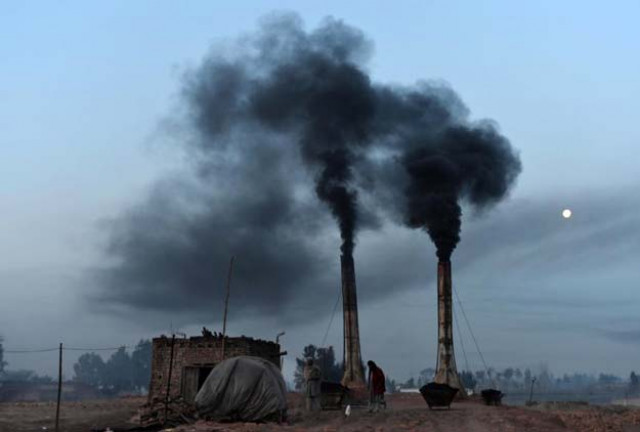Climate ministry to revive research arm
A new institutional architecture for climate action is to be proposed

Smoke rises form brick kilns in Peshawar. PHOTO: AFP
The GCISC, research arm of the ministry, has been run as an additional or acting charge ever since the retirement of its executive director Dr Ishfaq Ahmed several years ago.
Minister for Climate Change Zahid Hamid, briefing the media about the newly passed climate change act, said the centre helps in capacity building, policy analysis and information dissemination on issues related to past and projected future climatic changes in Pakistan.
The centre also assesses the likely impact of climate change on key socio-economic sectors such as water, food, agriculture, energy, forestry, health, and ecology and recommends adaptation and mitigation measures, he added.
He said a Pakistani scientist, member of the International Panel of Climate Change (IPCC), Dr Tariq Buneri would be appointed as executive director of GCISC for a year.
Hamid said soon meeting of Climate Change Council would be convened to formulate a strategy to deal with climate change impacts and will propose a new institutional architecture for climate action.
He said that the day of March 17, 2017 was a historic, red-letter day not just for the Ministry of Climate Change but also for the entire climate movement in Pakistan. Pakistan will be one of the few countries in the world with a law specifically dedicated to climate change. There are only a few countries that had this legislation. He said Pakistan Climate Change Bill was unanimously passed by both houses. The new law establishes three important institutions including the Pakistan Climate Change Council, the Pakistan Climate Change Authority and the Pakistan Climate Change Fund. He said that Pakistan Climate Change Council will be chaired by the prime minister and will include the chief ministers, federal ministers concerned, provincial environment ministers, chief secretaries of Azad Jammu and Kashmir and Gilgit Baltistan and others.
He said that the council shall be the apex policy-making body. Its functions include approval and monitoring implementation of comprehensive adaptation and mitigation policies, plans and projects to meet Pakistan’s obligations under international conventions and agreements and approval of guidelines for the protection and conservation of renewable and non-renewable resources, species, habitats, and biodiversity in general.
He said the authority would comprise the chairperson, member adaptation, member mitigation, member climate finance, member coordination and one member from each province to be nominated by the provincial ministers. The chairperson and members shall be scientists, academics, professionals, serving or retired government servants, industrialists, agriculturists or other technocrats with at least 15 years’ experience in fields related to climate change and the environment, with a distinguished service record.
The authority will be entrusted with a host of functions and duties, including formulation of comprehensive adaptation and mitigation policies, plans, and projects designed to meet Pakistan’s obligations under international conventions relating to climate change within the framework of a national climate change policy.
It would also be responsible for the establishment of institutional and policy mechanisms for implementation of federal and provincial adaptation and mitigation policies, plans and projects, including plans for renewable energy and clean technology, measures for energy efficiency and energy conservation; and awareness-raising and capacity-building programme.
The authority will also advise the government regarding appropriate legislative, policy and implementation measures. The authority will be manned by top professionals appointed strictly on merit. The third institution established by the act will be the Pakistan Climate Change Fund, into which will be paid donations, endowments, grants, and funds raised by execution of projects of the authority, he added,












1724319076-0/Untitled-design-(5)1724319076-0-208x130.webp)






COMMENTS
Comments are moderated and generally will be posted if they are on-topic and not abusive.
For more information, please see our Comments FAQ